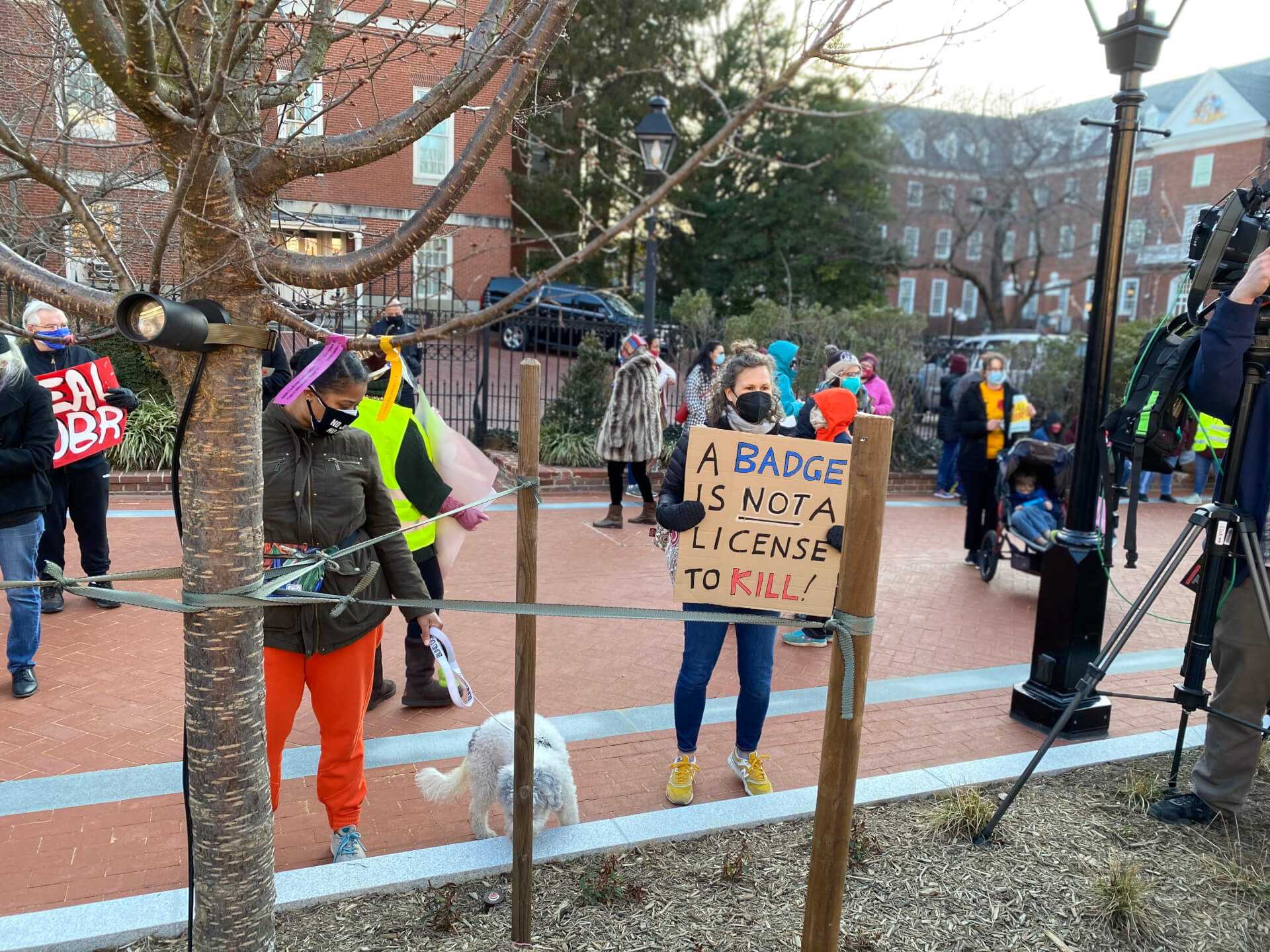Leaders Confident Police Reform Will Pass as Clock Ticks Closer to Sine Die

With less than a week until the Maryland General Assembly adjourns Sine Die, lawmakers are still struggling to craft one cohesive police reform package to be sent to the governor’s desk.
But House and Senate leaders continue to express hope that their differences can be reconciled and that the historic legislation will be sent to Gov. Lawrence J. Hogan Jr. (R) by 11:59 p.m. next Monday.
“After responding to the COVID crisis, the top issue to resolve this Session is police reform, and I am confident that we will pass a package of bills to the Governor’s desk before Sine Die,” Senate President Bill Ferguson (D-Baltimore City) said in a statement provided to Maryland Matters Monday night.
“Police reform is too important to get wrong. There are remaining issues in the police reform bills that must be ironed out in the next couple of days. They will get ironed out,” House Majority Leader Eric D. Luedtke (D-Montgomery) tweeted Saturday. “@mdhousedems and @MDSenate will get it done. Because the people deserve it.”
And the two chambers got a little closer to the finish line Monday night when the House passed one piece of legislation from the Senate Judicial Proceedings Committee’s bipartisan reform package.
SB 600, sponsored by Senate Judicial Proceedings Committee Chairman William C. Smith Jr. (D-Montgomery), would create a process to independently investigate use of force incidents resulting in death through a new independent investigative unit in the Attorney General’s office.
The bill was amended in the House Judiciary Committee to adopt measures from another bill from the Senate package that would prohibit law enforcement agencies from procuring surplus weaponized military equipment.
As the House debated the reform bill on the floor Monday night, Republicans laid out several arguments against the proposal: That it took investigations out of the hands of the state police, who, they argued are most qualified to handle such probes; that such a change amounted to a no-confidence vote of local police and prosecutors; and that a unit of the Attorney General’s office, based in Baltimore, could take hours to get to a crime scene in a far-flung part of the state.
Del. John F. “Johnny” Mautz IV (R-Middle Shore) and Del. Wayne A. Hartman (R-Lower Shore) offered amendments to take the Attorney General’s office out of the bill and keep the status quo for investigations of police-involved deaths.
“Every red vote up there [on my amendment] is going to mean you don’t have confidence in your state’s attorneys,” Hartman said.
House Judiciary Committee Chairman Luke H. Clippinger (D-Baltimore City), who along with the committee vice chair, Del. Vanessa Atterbeary (D-Howard), defended the bill and fought off the amendments, disagreed with Hartman’s assertion.
“A red vote,” he said, “means that you’re in favor of an independent investigative unit when there is a killing that a police officer is somehow involved in.”
Both amendments failed largely across party lines.
The bill eventually passed, 97-40.
Toward the end of the 90-minute debate, Republicans asked why, after the House put all its police reform measures into one major bill, the chamber was now considering some of the Senate bills in a piecemeal fashion.
“There were a range of Senate bills that passed over [to the House],” Clippinger explained. “We’re trying to deal with them in a fairly efficient manner.”
Senate Republicans have raised similar questions in recent days, suggesting that the chambers are playing a game of politics and wagering who will come out on top.
The House passed Speaker Adrienne A. Jones’ omnibus police reform bill on a party-line vote in mid-March and, much to the minority party’s dismay, the Senate Judicial Proceedings Committee ushered it onto the Senate floor after one marathon committee voting session last week.
Senate Republicans continued to push back against Jones’ bill, urging that it be recommitted to the committee to be worked on further or shelved completely until the House Judiciary Committee began voting on the Senate’s bipartisan police reform package.
Ultimately, the bill passed out of the Senate chamber late Thursday night, complete with 16 committee amendments and a handful of floor amendments.
Senate Minority Whip Michael J. Hough (R-Frederick) told Maryland Matters in an interview last week that Senate Republicans accepted a deal that would add a few of their friendly amendments to the bill if they didn’t argue against a sweeping amendment offered by Sen. Jill P. Carter (D-Baltimore City) that would make the bill more amenable to the House.
According to Hough, this arrangement also intended to avoid another late-night, marathon floor session and a conference committee.
Regardless of any negotiation, Clippinger rejected the Senate’s amendments to Jones’ bill Friday morning, appointing himself, Atterbeary and Del. David Moon (D-Montgomery) to serve on a conference committee to iron out any discrepancies in the legislation.
But the Senate rejected the request, neglecting to read the House’s message across the desk at either of its floor sessions Friday.
By the end of Monday night’s session, the Senate had still not appointed lawmakers to a conference committee or read the House’s message across the desk.
‘For The People In The Back’
Twitter fingers flew over the weekend, with Atterbeary accusing the Senate of disrespecting the legislative process in favor of serving its own interests.
“Again. For The People In The Back. Either You WANT #PoliceReform & #PoliceAccountability or You Don’t,” she wrote. “Refusing to participate in a Conference Committee on the most Sweeping piece of police reform legislation in the MGA is a sign that you don’t… you just want what you want.”
But the Senate also spent months working on its own reform package, which many lawmakers feel has been neglected by the House.
“Disingenuous to pretend there is only a single house bill at issue while ignoring that the house has not passed multiple senate bills – for a month,” Carter tweeted in response to Atterbeary. “Let’s quash the childish finger pointing, behave like adults & get it done. Posturing at this stage is just not helpful. #teamwork”
The Senate passed a package of nine police reform bills on largely bipartisan terms at the beginning of March.
Each piece of legislation in the package received hearings in the House Judiciary Committee at the month’s end, but only four heavily amended bills were voted out last Thursday, including SB 600 and:
- SB 786, sponsored by Sen. Cory V. McCray (D-Baltimore City), would return local control of the Baltimore Police Department to the city;
- SB 178, sponsored by Carter, would alter the Maryland Public Information Act to allow certain officer misconduct records to be available for public inspection and adopted portions of HB 670 and SB 419 to regulate the execution of warrants; and
- SB 71, sponsored by Sen. Charles E. Sydnor III (D-Baltimore County), would order police departments throughout Maryland to provide body-worn cameras for on-duty officers by 2025 and adopted portions of HB 670 and SB 626 to implement a statewide use of force policy.
The House passed SB 786 and SB 71 last week. SB 600 passed Monday.
SB 178 is still awaiting a final vote in the House chamber.
Luedtke said House members are concerned about an amendment in the Senate’s package that would allow officers convicted of domestic violence charges to continue serving on their respective police forces.
Moon said he was troubled by the Senate’s proposed use of force policy and the amended composition of the administrative charging committees.
Ultimately, major players in moving this legislation along don’t see huge differences between the House and Senate packages, but do note that there are a few issues that need to be reconciled.
“When I actually take a look on paper at where the House and Senate are — what some of the negotiations have been — I don’t think we’re that far apart, in truth, and the timing being what it is I fully expect we are going to get the same page before session lets out,” said Moon.
Luedtke also seems unbothered about the legislature’s ever-shortening timeline:
“Look, I have seen a bill introduced today and passed by Sine Die, and this hasn’t been introduced today,” he said. “Both sides have been talking about it for a year or more, so I have no doubt we’re gonna we’re going to come to an agreement and get it done.”





 Creative Commons Attribution
Creative Commons Attribution